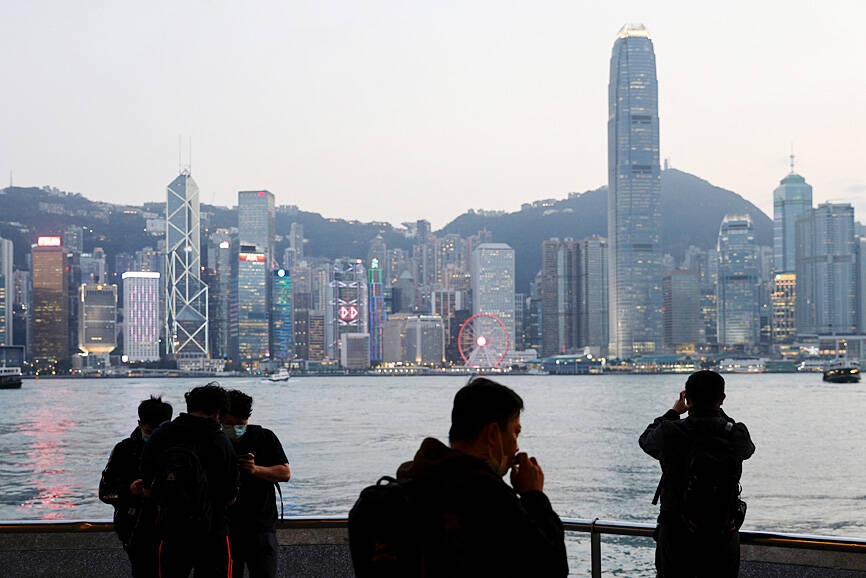The number of Hong Kongers obtaining permanent residency in Taiwan rose 10.5 percent from 2022 to last year, the Mainland Affairs Council (MAC) said.
Last year, 1,432 Hong Kongers obtained permanent residency in Taiwan, up from 1,296 in 2022, the council said in a recent report to the Legislative Yuan, after opposition lawmakers questioned whether the government had made the process more difficult by raising the threshold for Hong Kongers to obtain residency.
Residency applications under general immigration or humanitarian reasons are separate mechanisms that are handled independently, the council said, adding that the government is continuing to implement the Hong Kong Humanitarian Aid Project.

Photo: Reuters
The government welcomes talented people from Hong Kong and Macau who can contribute to the country’s development to apply through general immigration, it said.
Authorities have reported many applicants that contravened immigration laws and regulations, such as those applying for immigration as an investor without investing, applying as a professional worker without using their reported expertise or applying for family-based residency without family sponsors, it said.
Some fraudulent immigration applications have also been discovered, against which the government would take corrective measures, it said.
Applicants who meet the residency requirements stipulated in the Regulations Governing Permits for Hong Kong and Macau Residents Entering the Taiwan Area and Setting Up Residence or Registered Permanent Residence in the Republic of China (香港澳門居民進入台灣地區及居留定居許可辦法) and are deemed to pose no national security risk would be granted residency, the MAC said.
If applications raise concerns or the documents submitted are incomplete, authorities would give the applicants six months to one year to submit additional information or documents, it said.
The cases would be provided with a notice that clearly states the information or documents that should be supplemented, it said, adding that authorities would respond to any further inquiries from applicants.
Providing a grace period for applicants is an approach based on humanity and goodwill, rather than an attempt to delay the review process, the MAC said.
The council is striving to coordinate agencies on establishing review criteria and protocols for handling residency applications from Hong Kongers and Macanese, it said.
In the past year, many Hong Kongers have spoken positively about the government’s assistance in their resettlement, it said.
Some YouTubers who recently moved from Hong Kong made videos to help people better understand the government’s stance and practices, the MAC said.
The political situation in Hong Kong has changed dramatically in the past few years, which also affects its population, at least one-fifth of which is originally from mainland China, it said.
The government would review residency applications cautiously to ensure national security and long-term social stability, it said.
The council would continue assisting agencies with residency application reviews as well as with bridging the gap between the cultures of Taiwan and Hong Kong to help Hong Kongers residing in Taiwan better adapt to their lives in the nation as soon as possible, it said.

Beijing could eventually see a full amphibious invasion of Taiwan as the only "prudent" way to bring about unification, the US Department of Defense said in a newly released annual report to Congress. The Pentagon's "Annual Report to Congress: Military and Security Developments Involving the People's Republic of China 2025," was in many ways similar to last year’s report but reorganized the analysis of the options China has to take over Taiwan. Generally, according to the report, Chinese leaders view the People's Liberation Army's (PLA) capabilities for a Taiwan campaign as improving, but they remain uncertain about its readiness to successfully seize

Taiwan is getting a day off on Christmas for the first time in 25 years. The change comes after opposition parties passed a law earlier this year to add or restore five public holidays, including Constitution Day, which falls on today, Dec. 25. The day marks the 1947 adoption of the constitution of the Republic of China, as the government in Taipei is formally known. Back then the Chinese Nationalist Party (KMT) governed China from Nanjing. When the KMT, now an opposition party in Taiwan, passed the legislation on holidays, it said that they would help “commemorate the history of national development.” That

Trips for more than 100,000 international and domestic air travelers could be disrupted as China launches a military exercise around Taiwan today, Taiwan’s Civil Aviation Administration (CAA) said yesterday. The exercise could affect nearly 900 flights scheduled to enter the Taipei Flight Information Region (FIR) during the exercise window, it added. A notice issued by the Chinese Civil Aviation Administration showed there would be seven temporary zones around the Taiwan Strait which would be used for live-fire exercises, lasting from 8am to 6pm today. All aircraft are prohibited from entering during exercise, it says. Taipei FIR has 14 international air routes and

Snow fell on Yushan (Jade Mountain, 玉山) yesterday morning as a continental cold air mass sent temperatures below freezing on Taiwan’s tallest peak, the Central Weather Administration (CWA) said. Snowflakes were seen on Yushan’s north peak from 6:28am to 6:38am, but they did not fully cover the ground and no accumulation was recorded, the CWA said. As of 7:42am, the lowest temperature recorded across Taiwan was minus-5.5°C at Yushan’s Fengkou observatory and minus-4.7°C at the Yushan observatory, CWA data showed. On Hehuanshan (合歡山) in Nantou County, a low of 1.3°C was recorded at 6:39pm, when ice pellets fell at Songsyue Lodge (松雪樓), a